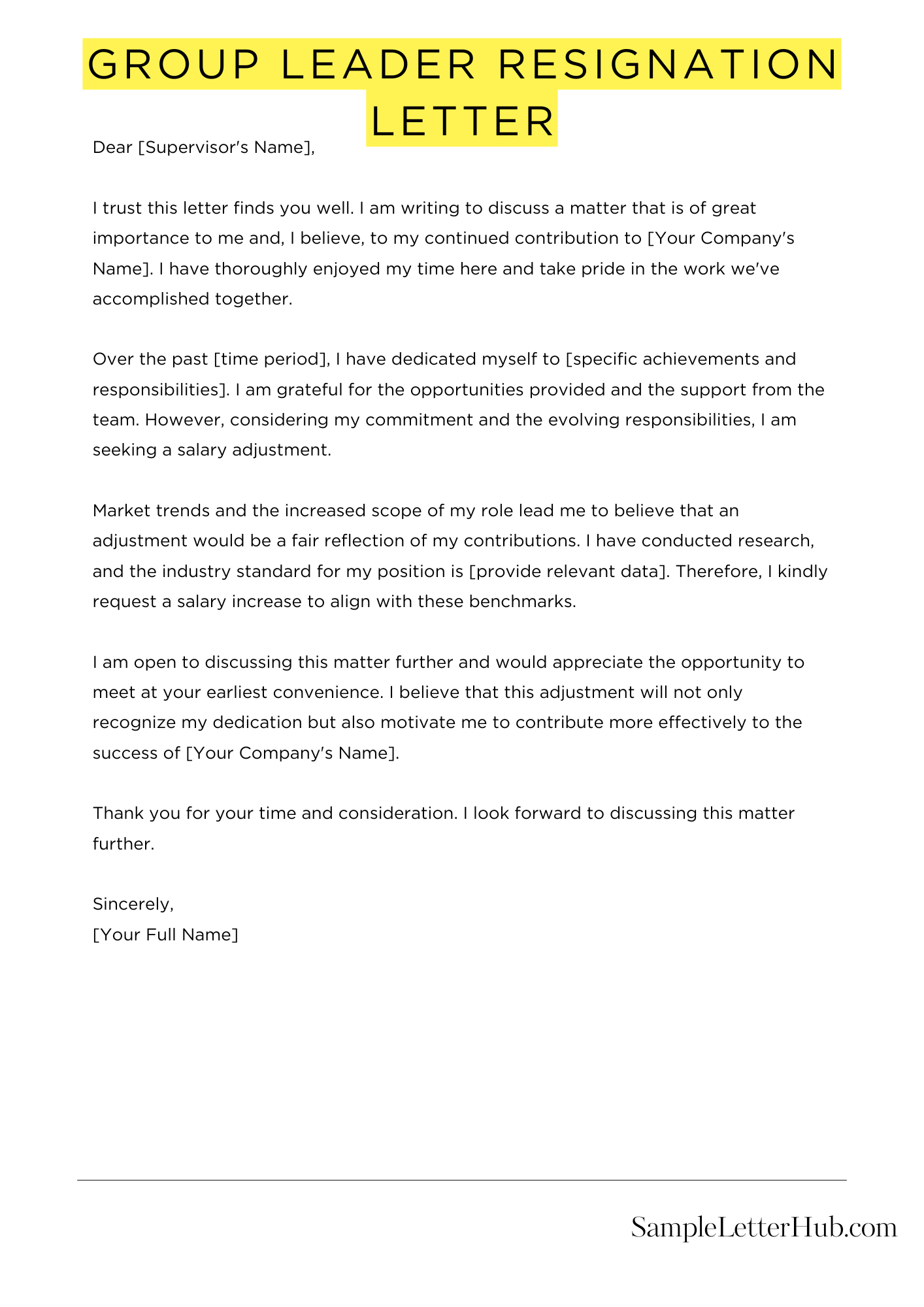When it comes to leaving a group leader position, a well-crafted resignation letter is essential. In this article, we’ll share an example of a group leader resignation letter that you can use as inspiration.
A resignation letter is a formal way to inform your employer of your decision to leave your position. It should be clear, concise, and professional. Be polite and humble in your tone, and express your gratitude for the opportunity to work with the group.
Below, we’ve provided a template/example group leader resignation letter that you can use as a starting point. Feel free to adapt it to your own circumstances and style.
Group Leader Resignation Letter
Dear [Recipient Name],
Please accept this letter as formal notification that I will be resigning from my position as Group Leader, effective [last date of employment].
I have enjoyed my time with the organization and am grateful for the opportunities I have been given. I have learned a great deal and have made valuable connections during my tenure.
I wish you and the organization all the best in the future.
Sincerely,
[Your Signature]
Short Group Leader Resignation Letter Sample
Please accept this letter as formal notification that I am resigning from my position as Group Leader at [Company Name]. My last day of employment will be [Your Last Day]. Thank you for the opportunity to grow and learn during my time here. I wish you and the company continued success. I am happy to assist in the transition process to ensure a smooth handover of my responsibilities.
I wish you all the best with your group leader resignation letter.
When it’s time to say farewell, expressing your gratitude and best wishes can make the transition smoother:

How to Write a Group Leader Resignation Letter
1. Start with a Formal Salutation
Begin your letter with a formal salutation, such as “Dear [Group Name]”. This shows respect for the group and its members.
2. State Your Resignation Clearly
In the first paragraph, clearly state your intention to resign from your position as group leader. Be direct and to the point, such as “I am writing to inform you of my decision to resign from my position as group leader, effective [date].”
3. Express Gratitude and Appreciation
Take this opportunity to express your gratitude for the opportunity to lead the group. Mention any specific experiences or accomplishments that you are particularly proud of. For example, you could say, “I am grateful for the opportunity to have led this group for the past [number] years. I have enjoyed working with each and every one of you, and I am proud of what we have accomplished together.”
4. Offer to Help with the Transition
If possible, offer to help with the transition to a new group leader. This could involve training your replacement or assisting with the handover of responsibilities. For example, you could say, “I am happy to help in any way that I can to ensure a smooth transition.”
5. Close with a Positive Note
End your letter on a positive note by expressing your continued support for the group. You could say something like, “I wish you all the best in the future, and I am confident that the group will continue to thrive under new leadership.
Most Frequently Asked Questions on Group Leader Resignation Letter
When it comes to writing a group leader resignation letter, there are several common questions that arise. Here are six frequently asked questions and their answers to help you craft an effective resignation letter:
What is the appropriate format for a group leader resignation letter?
A group leader resignation letter typically follows a formal business letter format. It should include your name, address, date, the recipient’s name and title, and the organization’s name and address. The body of the letter should clearly state your intention to resign from your position as group leader, along with your last date of employment.
What should I include in the body of my resignation letter?
In the body of your resignation letter, you should express your gratitude for the opportunity to work as a group leader and highlight your key accomplishments during your tenure. You can also briefly mention your reasons for leaving, but it’s not necessary to go into excessive detail. Keep the tone of your letter professional and respectful.
How much notice should I give?
The amount of notice you should give will vary depending on your organization’s policies and the terms of your employment contract. It’s generally advisable to provide at least two weeks’ notice, but if you have a long tenure with the organization or hold a senior position, you may want to give more notice.
What if I’m not sure about my reasons for leaving?
If you’re not entirely sure about your reasons for leaving, it’s okay to simply state that you’re seeking new opportunities or that you’re pursuing other interests. You don’t have to provide a detailed explanation, but it’s important to be honest and professional in your letter.
Should I offer to help with the transition?
Offering to help with the transition is a thoughtful gesture that can leave a positive impression. You can offer to train your replacement, assist with handover tasks, or provide any other support that would make the transition smoother.
What should I do after submitting my resignation letter?
After submitting your resignation letter, it’s important to maintain a positive and professional attitude. Continue to perform your job duties to the best of your ability and assist with the transition in any way you can. You may also want to schedule a meeting with your manager to discuss your departure and any outstanding matters.
Before making the decision to resign from your job, it’s essential to consider the legal aspects:
Understanding your emotions after quitting your job is important. Explore why you might be feeling sad:
Related
- Resignation letter sample
- Forced resignation letter
- Resignation letter due to going abroad
- Resignation letter due to marriage
- Resignation letter due to other opportunity
- Resignation letter due to mistake

